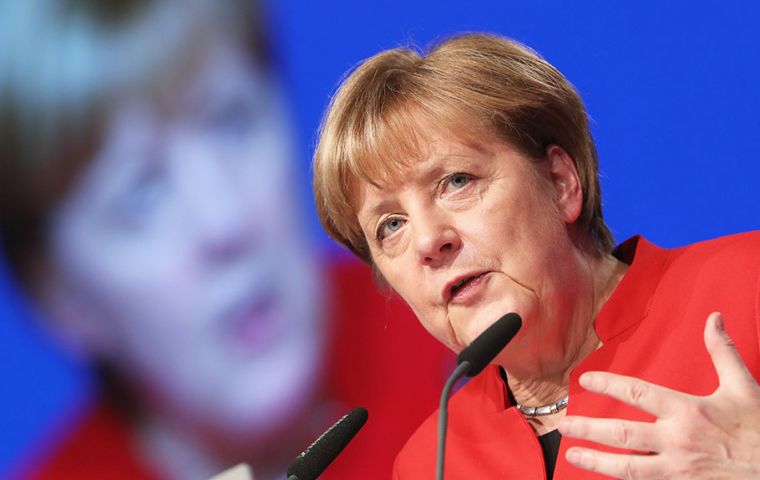MercoPress. South Atlantic News Agency
Merkel U-turns on immigration as she launches reelection campaign
 Angela Merkel is suprisingly not so open to immigration as she launches her reelection campaign
Angela Merkel is suprisingly not so open to immigration as she launches her reelection campaign German Chancellor Angela Merkel has called for a public ban on the full-face veil as her political party gears up to back her for a fourth term in office. “Here we say 'show your face'. So full veiling is not appropriate here. It should be prohibited wherever legally possible,”
Merkel told her supporters during her speech at the Christian Democratic Union federal congress in Essen. She also said “not every refugee can stay.” Delegates celebrated the chancellor's one-and-half hour speech with an 11-minute standing ovation.
Merkel had earlier described the wearing of Muslim clothes, which fully covers the body, as a “sign of failed integration.” Outlining a strategy to counter populism that has consumed key allies abroad, Merkel also vowed there would be no repeat of last year's record refugee arrivals. “A situation like that [in] the summer of 2015 can and should not be repeated,” Merkel said at the two-day conference in the western industrial city of Essen. “This was and remains our declared political goal.”
The suggested policy won Merkel overwhelming applause on Tuesday from about 1,000 delegates ahead of her conservative Christian Democrats' (CDU) party conference vote, which is expected to return her for the ninth time as its chief. The party has already begun drawing up plans for banning the full veil in areas such as courts, police checks, and while driving vehicles.
The CDU's moves to forge a stricter approach to refugees at its conference comes in the wake of a string of state election successes by the right-wing populist Alternative for Germany (AfD). In particular, the AfD has siphoned votes from the CDU after capitalising on anger in parts of the German electorate over Merkel's liberal refugee policy. Polls show nevertheless that her CDU is the clear frontrunner in the general election, expected in September 2017. The AfD is currently polling at about 12 percent nationally.
Merkel's government has attempted to address public fears surrounding last year's record influx of nearly 1.1 million refugees and migrants, mostly from predominantly Muslim countries. Merkel, who has led Germany for 11 years, last month confirmed she would run for a fourth term but acknowledged the election would be “more difficult” than any other she has contested.
But dissenters made their voices heard when delegates were asked to re-elect Merkel as chief for the next two years, as the congress gave her just 89.5 percent -- her second worst score, and the worst since she became chancellor in 2005. Her lowest was in 2004, when she was approved by 88.4 percent. National media had suggested that a score below 90 percent would be a slap in the face.
Merkel, who has led Germany for 11 years, last month confirmed she would run for a fourth term but acknowledged that the election would be “more difficult” than any other she has contested. Merkel's CDU and its Bavarian sister party CSU sailed to a decisive win of 41.5 percent at the last election in 2013 - its best result since national reunification in 1990, on the back of strong approval for her tough stance on austerity for debt-stricken EU nations.
Three years on, there are rumblings of discontent - even within her own party - following her September 2015 decision to admit refugees fleeing war in mostly-Muslim nations, a move that deeply polarised Europe's biggest economy.
There have also been questions about whether the 62-year-old has fresh ideas to offer in a world upended by Brexit, the surprise election of Donald Trump and the crushing referendum defeat of PM Matteo Renzi in Italy championed by populists.
“Rarely is it the simple answers that bring progress to our country,” she said, in a clear reference to the upstart anti-Islam and populist AfD, which Merkel had previously criticised as offering no solutions to problems.
Party members are particularly anxious to halt a haemorrhage of support to the AfD, which now enjoys around 12 percent support, according to opinion polls. At the last general election it fell short of the five-percent threshold to ensure representation.
Merkel also underlined the importance of holding the European Union together, saying Germany will do well “only when Europe does well too”.




Top Comments
Disclaimer & comment rules-

Read all commentsThis person is a sleazy politician.
Dec 08th, 2016 - 02:36 am -1Commenting for this story is now closed.
If you have a Facebook account, become a fan and comment on our Facebook Page!